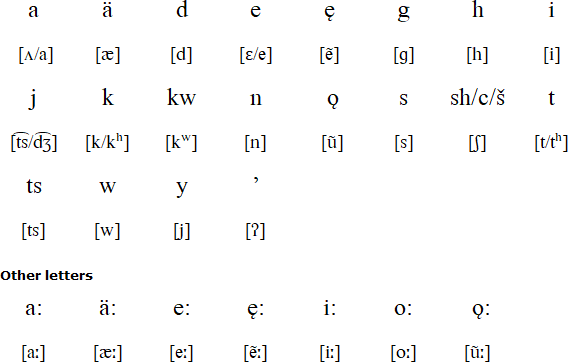Onondaga is a Northern Iroquoian language spoken on the Six Nations Reserve near Brantford in Ontario in Canada, and south of Syracuse in central New York state in the USA. In 2007 there were 40 Onondaga speakers in Canada and 12 in the USA. The majority of speakers are elderly, however efforts are being made to revitalize the language, and some younger people are learning it.
The language is used when presenting laws and ideas before the council of the Onondaga Nation, and for chief titles and the recitation of the laws. Songs are also sung in the language.
The Onondaga Nation was one of the original members of the Iroquois League (Kanonsionni) along with the Mohawk, Seneca, Cayuga and Oneida. They were later joined by the Tuscarora, and refer to themselves as Haudenosaunee ("people of the longhouse") or Six Nations.
Until the 1930s Onondaga was spoken by the almost all of the Onondaga Nation. Young Onondagas were ridiculed at school for speaking their language and a shift to English began. When they grew they did not pass the language to their children as they did not want them to go through the same experiences and school. During and after World War II many people left their territory and found that they needed to speak English.
Onondaga has been taught in schools since the 1980s, however students cannot receive credits for it. There are also classes for adults. An Onondaga dictionary was published in 2003, and is used in classes.
Each of the Onondaga communities has their own way of writing their language, with only minor differences between them. Where there are differences, the Six Nations orthography is shown first below.

Download an alphabet chart for Onondaga (Excel)
Nę́gę tshaʼ nigagaeʼdę́h, ǫkhiya:tho:yę́:nik tshaʼ gáyeʼ, hodiksdęʼshǫʼagę́hä:ʼ shonadǫ:góhdi ó:nę. Węda:déhgwaʼ tshaʼ nǫ́ nę nǫ́ nihadina:gé:hgwaʼ, nę nǫ́ tshaʼ nǫ́ ha:yę:nadę́hda:ʼ néʼ iwá:dǫk, shǫgwa:de:ęnóʼkdaʼ gaęhya:gǫ́wa tho:yę́hdi. Naʼ nęgę́ neʼ tshaʼ gá:yęʼ shagoyaʼdanǫhnáʼ, tshaʼ gá:yęʼ hahwáʼ gatshatsdęhsä́:ʼ tshaʼ ní:yot waʼtshagoyaʼdowéhdęʼ.
Néñgeñ tshaʼ nigagaeʼdéñh, oñkhiya:tho:yéñ:nik tshaʼ gáyeʼ, hodiksdeñʼshoñʼagéñhä:ʼ shonadoñ:góhdi ó:neñ. Weñda:déhgwaʼ tshaʼ nóñ neñ nóñ nihadina:gé:hgwaʼ, neñ nóñ tshaʼ nóñ ha:yeñ:nadéñhda:ʼ néʼ iwá:doñk, shoñgwa:de:eñnóʼkdaʼ gaeñhya:góñwa tho:yéñhdi. Naʼ neñgéñ neʼ tshaʼ gá:yeñʼ shagoyaʼdanoñhnáʼ, tshaʼ gá:yeñʼ hahwáʼ gatshatsdeñhsä́:ʼ tshaʼ ní:yot waʼtshagoyaʼdowéhdeñʼ.
Source: http://www.languagegeek.com/rotinonhsonni/ono_example.html
Information about Onondaga | Numbers
Information about the Onondaga people and language
http://en.wikipedia.org/wiki/Onondaga_language
http://fr.wikipedia.org/wiki/Onondaga_(langue)
https://ru.wikipedia.org/wiki/Онондага_(язык)
https://www.ethnologue.com/18/language/ono/
http://www.languagegeek.com/rotinonhsonni/onondaga.html
http://www.onondaganation.org/culture/language.html
Cayuga, Cherokee, Mohawk, Oneida, Onondaga, Seneca, Tuscarora, Wendat
Languages written with the Latin alphabet
Page last modified: 23.04.21
[top]
You can support this site by Buying Me A Coffee, and if you like what you see on this page, you can use the buttons below to share it with people you know.

If you like this site and find it useful, you can support it by making a donation via PayPal or Patreon, or by contributing in other ways. Omniglot is how I make my living.
Note: all links on this site to Amazon.com, Amazon.co.uk
and Amazon.fr
are affiliate links. This means I earn a commission if you click on any of them and buy something. So by clicking on these links you can help to support this site.
[top]